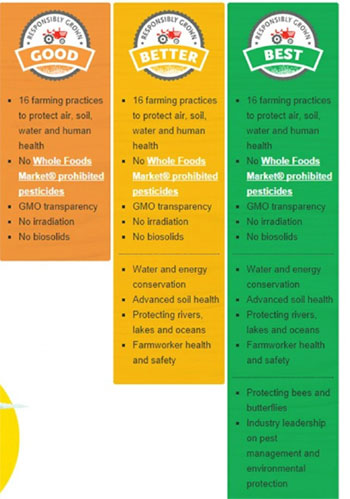If you shop at Whole Foods Market you’ll see something new this month – signs that rate the sustainability of suppliers for produce and flowers.
The idea is to help shoppers make more informed purchasers, encourage suppliers to improve their farming practices, and reward those who excel.
Besides the signs that tell you whether a product is "Organic," "Local" and/or "Conventional," they will have a "good," "better" and "best" rating, based on farming practices:
- Pest management, including prohibited and restricted pesticides
- Farmworker welfare
- Pollinator protection
- Water conservation and protection
- Soil health
- Ecosystems
- Biodiversity
- Waste, recycling and packaging
- Energy
- Climate
Whole Foods says it developed a science-based index to measure farming practices with input from sustainable agriculture experts and suppliers.

Certified organic growers will obviously start out with high ratings, but now they too will compete for "best" ratings. Do they go beyond certification requirements, focusing also on farmworker welfare, biodiversity and resource conservation? Do they have other certifications, such as Fair Trade, Rainforest Alliance, Protected Harvest, and Demeter Biodynamic certification?
On the conventional side, Whole Foods wants to push growers to eliminate or restrict the most toxic pesticides, especially important for imports where more toxic products are still used. Some 14 pesticides are prohibited, but 4 neonics are somehow allowed.
We’ve never understood why Whole Foods diminishes its brand by even carrying conventional produce and flowers.
But the new ratings will give us a view behind the scenes even for certified organic growers. Do they actively support pollinator populations by allowing enough wildflowers to grow, for example? How do they manage their waste?
"Responsibly Grown" signs appear for about half the produce in 390 supermarkets in the US and Canada this week.
Whole Foods has long led the industry with its ratings of meat and seafood, which allow shoppers to make choices based on animal welfare and sustainable fishing practices. They also rate household cleaners and by 2018, all foods will be labeled for GMOs. It ranks #1 in the US for selling sustainably-sourced seafood and for the safest cosmetics.
Walmart Too?
At this months’ Global Sustainability Milestone Meeting, Walmart announced a new Climate Smart Agriculture Platform to coax suppliers toward more sustainable farming practices. It will provide transparency on greenhouse gas emissions, water use and other measures.
The company also plans to provide product information on where they come from and how they are made and is making a big push into organic food.
Read our article, Is Walmart’s Move to Cheap Organic Food a Good Thing?

